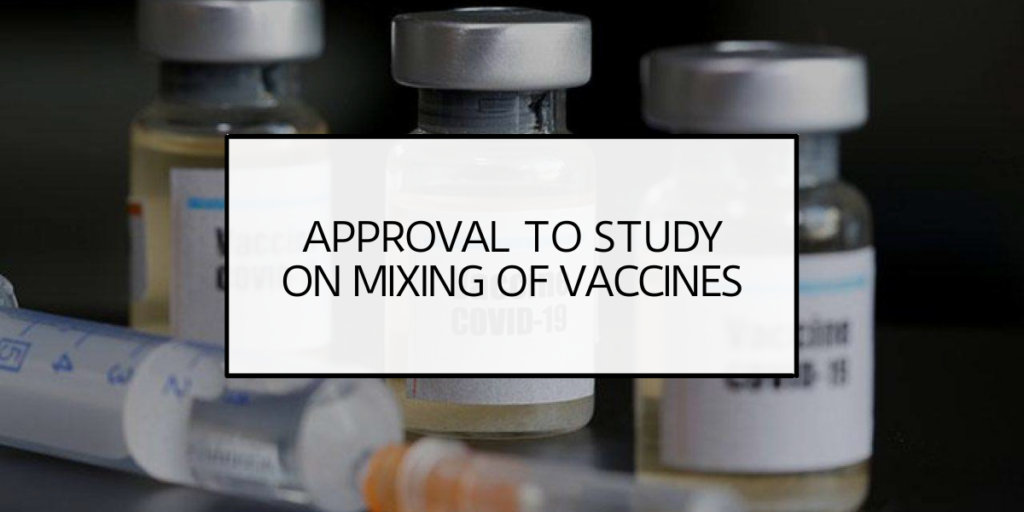According to some sources, a study on mixing Covishield and Covaxin was approved by the DGCI. As a result, The Drugs Controller General Of India has approved the mixing of the two main vaccines of the Indian vaccination program.
This study and its clinical trials, sources add, will be conducted by Vellore’s Christian Medical College.
A Subject Expert Committee of the Central Drugs Standard Control Organisation (CDSCO) had recommended conducting the study on July 29
The study suggested immunization with a combination of an adenovirus vector platform-based vaccine followed by an inactivated whole virus vaccine was safe. Furthermore, it also elicited better immunogenicity.
Why mix two different Covid-19 vaccines, or why not?
Worldwide, studies are underway to understand if a combination of two different vaccines can outperform two doses of the same vaccine.
According to experts, the mixing of vaccines shouldn’t be done randomly. Considering some issues is important before the mixing takes place.
According to a study by ICMR, it is completely safe to mix the two vaccines also provides better immunity.
Covishield is an adenovirus vector platform-based vaccine. Covaxin is an inactivated whole virus vaccine. In other words, these are two very different platforms.
Who participated in the ICMR study?
The study was the result of a mistake. In Uttar Pradesh, 18 villagers took Covaxin as the second dose in May. This happened 6 weeks after getting Covishield as the first dose.
The study compared the response of the vaccines of these 18 individuals to that of 40 recipients of two doses of Covishield, and 40 recipients of two doses of Covaxin.
“Overall, this study demonstrates that immunization with a heterologous combination of an adenovirus vector platform-based vaccine followed by an inactivated whole virus vaccine is safe and elicits better immunogenicity than two doses of homologous vaccination, using the same vaccines,” the study said.
What do the findings explain?
While ICMR using a mistake to get some preliminary data on heterologous vaccination is commendable, there is no great novelty in the approach. These results are really preliminary because it examines only 18 individuals with mixed vaccination.
When does the mixing of the vaccines happen?
Before Covid-19, studies have shown better and broader immune responses with the mixing of vaccines of different types. Vaccine platforms may vary in their ability to induce antibody and T-cell response.
Experts say one platform induces a predominantly antibody response bettered by a different method if one platform induces a predominantly antibody response. One can follow it followed by a platform that induces predominantly a T cell response (e.g. vector and DNA vaccines).
Such heterologous strategies are being studied in HIV, malaria, flavivirus (e.g. dengue), HPV, Ebola, and influenza. All are in early-stage trials, said Dr. Sanjay Pujari, infectious diseases specialist and expert member with the national Covid 19 task force.
Can such a combination strategy work with Covaxin and Covishield vaccines?
“Covishield will trigger only an anti-spike protein response (and of course anti -adenovirus response). Covaxin used as a booster in principle should boost anti-spike response further and generate a primary response against all other SARS-CoV-2 proteins which are part of the Covaxin preparation,” Dr. Bal said.
There was no data from clinical trials to support the mixing. “Even now there is very limited data,” Dr. Bal said.
Where else was this tested?
The AstraZeneca vaccine was discovered to be associated with blood clotting in a handful of individuals. As a result, the idea of heterologous boosting initially emerged in Europe.
Many countries recommended a second dose with a different platform (especially mRNA) for the young population
The evidence for efficacy and safety of heterologous vaccine strategies are only 2-3. Phase 2 and cohort studies up to 1000 individuals.
There are no reports yet of Large phase 3 trials assessing vaccine efficacy on the symptomatic illness of heterologous versus homologous strategies.
Do read our other analysis too.
- ANALYZING BUSINESS MODEL OF CRED
- MORE WOMEN TEACHERS IN SCHOOLS: UDISE
- DIDI APP GET SUSPENDED IN CHINA
- Paytm IPO: Stock price spikes by 70 percent

